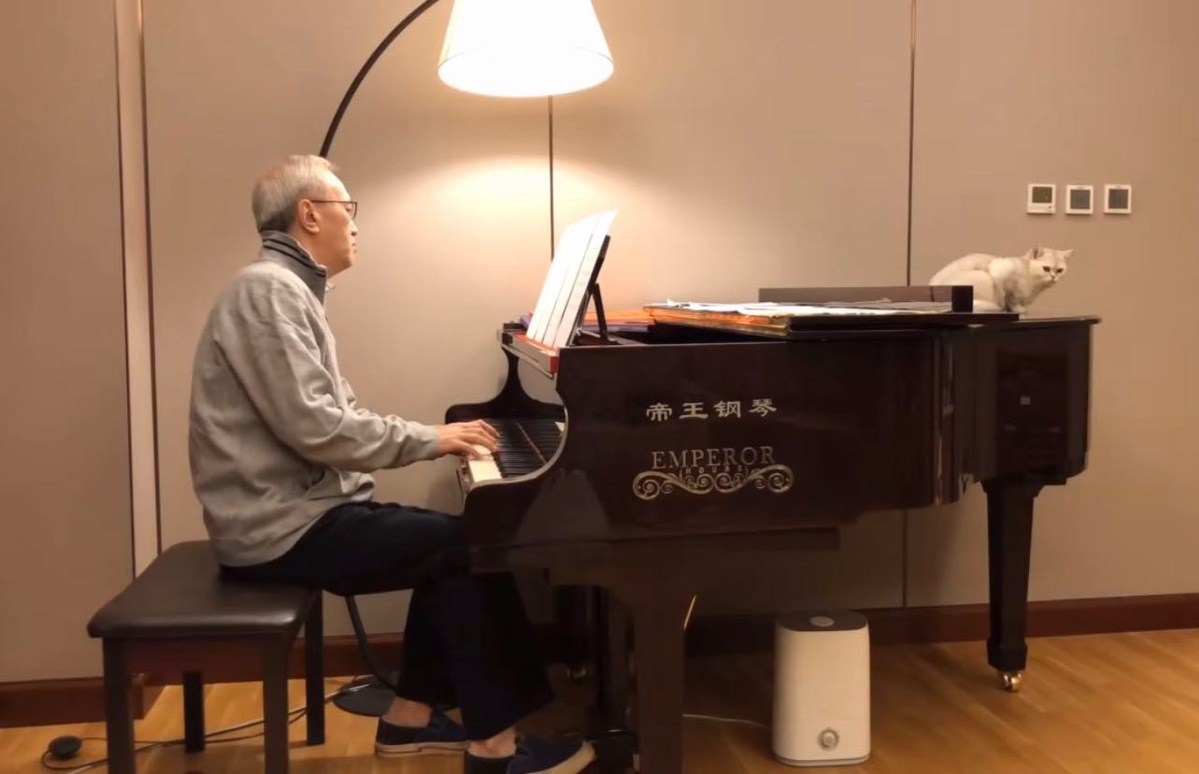Piano man, 60, hits the high notes online


When Yang Su's piano rendition of Moscow Nights was posted by a friend on short video platform Douyin in November 2017, nobody expected that it would restart the 60-year-old man's musical career.
The 15-second impromptu performance sees Yang flutter his fingers quickly between notes from his living room in Beijing. It racked up about 3 million views within hours.
"It is beyond my expectations. As the internet opens a new world to me, it helps to share my musical talent with more people," Yang says. Since then, he has posted hundreds of videos, including piano renditions of popular songs, like Jay Chou's recent single Mojito and A Moonlit Night on the Spring River, a signature pipa (a four-stringed lute) piece of the Chinese classical repertoire, and classical music pieces, such as the famous Carmen melody and French solo piano music Wedding of Love.
Attracted by his tunes, his Douyin account has lured 2.4 million followers with over 15.7 million likes so far.
In a space commonly dominated by the younger generation, Yang doesn't feel the burden of his age. In his words, he "has always stayed young at heart and never given up".
Starting with the basics of Douyin, he learned how to record, edit and upload video clips on the platform. To play a song without making mistakes, he repeats one song dozens of times at first. Setting up a phone holder, adjusting it to the right angle with the right lighting and starting to play piano has been his routine in the past two years. Every Friday, he presents a live performance on Douyin for two hours.
These videos have gone viral on social media and many internet users have nicknamed him "Pianist Grandpa". Comments include that it was "an absolute joy" and some "cannot stop listening".
His first post on Douyin had more than 31,000 comments and around 2.4 million likes and 78,000 reposts.
"Their passion for music reminds me of my days learning the piano, when it was an instrument unheard of by most people," Yang recalls.
Born in Harbin, Heilongjiang province, Yang's mother arranged for him to learn piano at 11.
His lessons started on a piece of paper with the keys drawn on it by his father. At the age of 14, his mother sent him to Beijing for further study and in 1978, Yang entered the Shanghai Conservatory of Music to study piano. He was among the first batch of the country's art college students. That year marked the resumption of gaokao (national college entrance examination) for art students after a decade-long suspension.
Graduating in 1982, he got work at the Harbin Opera House and in 1983, he was transferred as a solo pianist to the Shenzhen Symphony Orchestra. With a stable and comfortable job, Yang was still not satisfied and he wanted to see the world "beyond the 88 keys", he says.
In 1989, he joined Shenzhen International Exhibition Center, where he was in charge of an advertising company, a model company and a magazine under the center.
In 1992, Yang left the center. He tried various jobs, including professional bowling and screenwriting. He has been through "ups and downs" in the past three decades, he says.
Since leaving the orchestra, he had rarely played the piano until his video was posted on Douyin in late 2017.
"It is like returning to the starting point," Yang says, adding that looking back on the past experiences, he realizes that the essence of life is to know who you are and stay simple.
Facing his fame online, Yang is quite calm and he has tried to respond to most comments under his posts and offers an on-demand jukebox service to interact with his fans.
"I hope to bring piano, something considered classy, closer to the public through the internet," Yang adds.
Some viewers asked if he can teach piano, so he has opened a piano course online for adults, charging between 600 yuan ($87) and 2,000 yuan for 40 to 60 lessons. So far, more than 4,000 people from home and abroad have attended his course. Their ages range from 20 to 60.
"At the peak time, I need to teach over the screen at the dinner table or even in the bathroom," Yang says.
Last year, Yang became an art promoter for Douyin to make the instrument more accessible.
Videos of everyday people showcasing their talent have proved particularly popular on social media, which leads to the intensifying competition to snap up good content creators for video platforms.
These platforms have sweetened their offerings, such as support teams and funding, for top-ranking creators, like Yang, to help them make money through their videos.
Recently, Yang signed a two-year contract with ByteDance to provide exclusive original content to its video apps of Douyin and Xigua and its news portal Toutiao.
According to Xigua, there were more than 600 video creators, who earned over 500,000 yuan in 2018.
In September last year, Douyin launched DOU Art Project to promote art education to the public.
As of June, art videos on Douyin has been viewed more than 1.5 trillion times and since the COVID-19 outbreak, nearly 1,000 artists, such as dancers, violinists, opera performers, painters, sculptors and calligraphers, have livestreamed lessons to help people pass the time at home, according to statistics from Douyin.
In June, internet search giant Baidu's Haokan video app launched a plan to support vloggers in eight categories, including culture and art.
Bilibili has opened up its matchmaking service Sparkle to increase commercial chances for creators.
Embracing the short video age, scholars say that the technology helps make art more accessible and attractive to the younger generation.
Wang Jie, a professor at College of Media and International Culture under Zhejiang University, told Economic Information Daily at a recent seminar on short video platforms' role in art and cultural promotion that "the popularity of the short video platforms has blurred the boundaries between artists and ordinary people and boosted creativity and imagination in art creation".




































